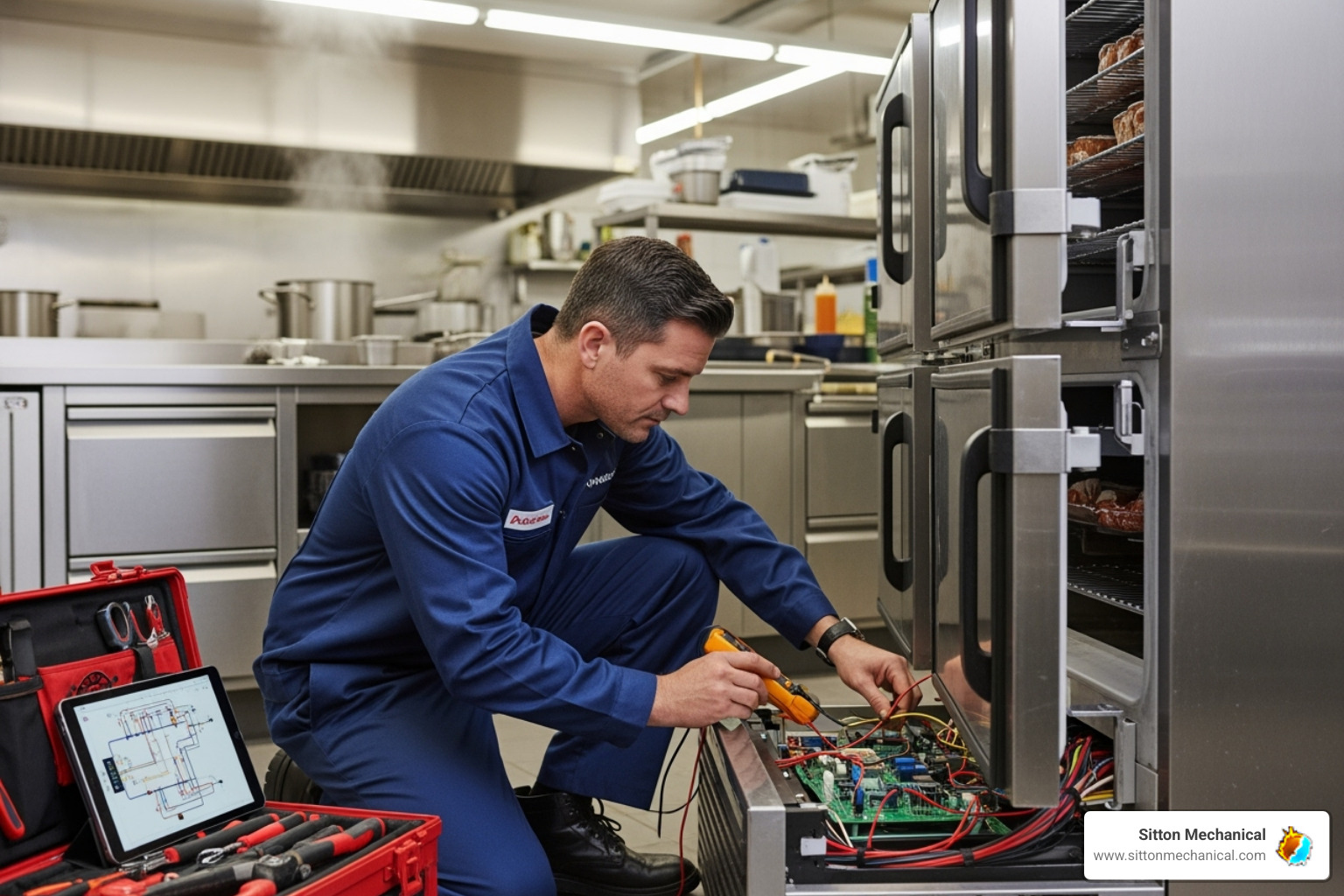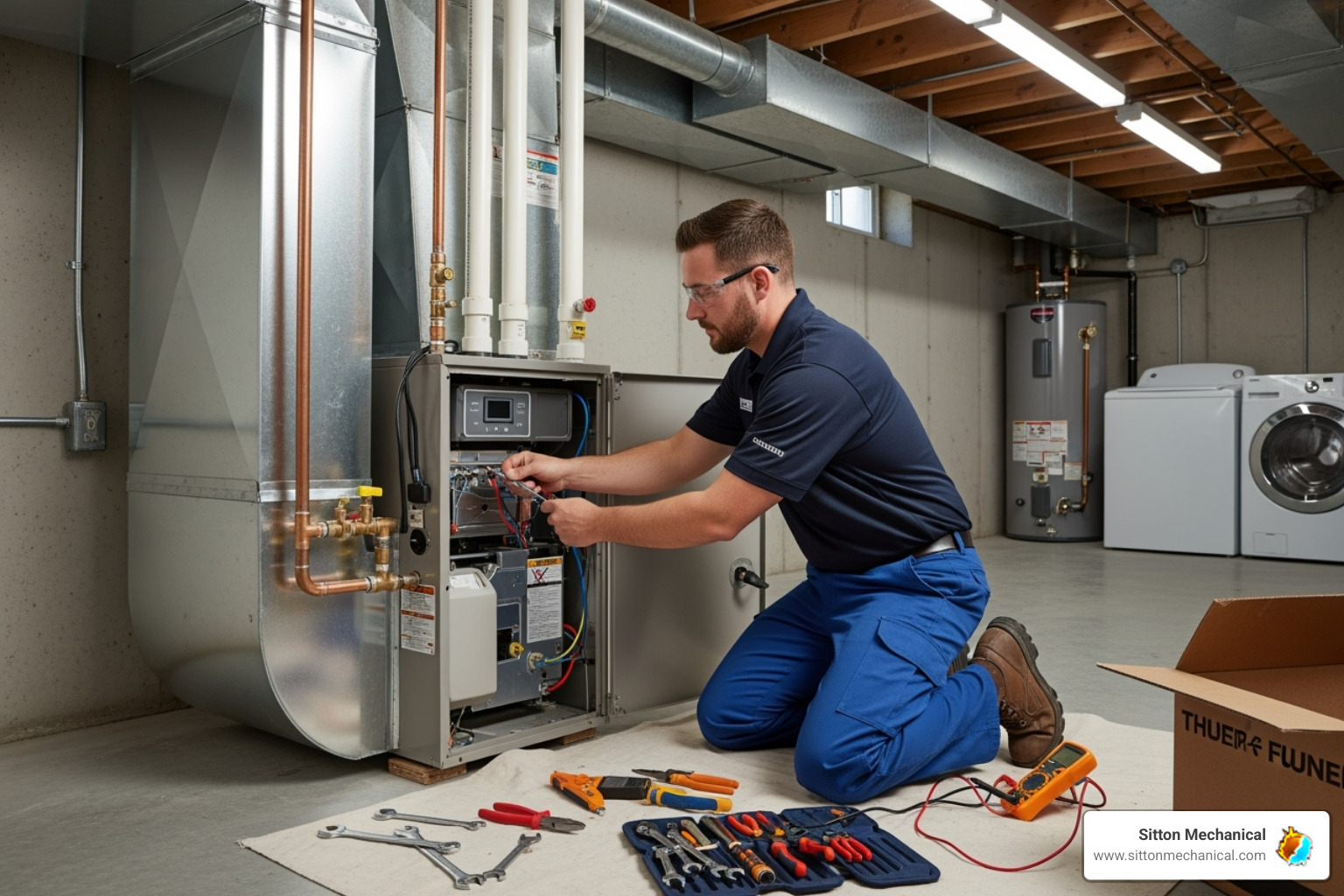If you've noticed a musty or sour smell coming from your vents this summer, you're not alone. Many homeowners in Stillwater struggle with moldy odors coming from their AC systems, especially during the hotter months when air conditioning is running non-stop. It’s the kind of smell that's hard to ignore, and it usually doesn’t go away on its own. That odor isn’t just unpleasant — it’s a sign something deeper may be going on inside your system.
Ignoring the issue can lead to more discomfort and even possible health concerns for anyone in your home. Odors like this are often connected to mold or mildew growing somewhere in the system, which means your indoor air quality could be getting worse every time the AC kicks on. It’s important to figure out the cause of the smell early and get it taken care of before it creates bigger problems.
Common Causes Of Moldy Smells In AC Units
A moldy smell coming from your AC isn’t something to brush off. It's usually a warning that moisture is sitting inside your system for too long. That moisture gives mold spores a place to grow, and once they do, the smell gets carried all through your home via the ductwork.
Several areas inside your AC can become problem spots when it comes to moisture and odor buildup:
- A dirty or old air filter can start to collect debris and retain moisture, especially if it hasn’t been changed in a while. That buildup becomes the perfect environment for mold to grow.
- The evaporator coils can become coated with dust and grime, which mixes with condensation and traps damp air inside.
- A clogged condensate drain line stops water from draining out of the system like it should. When water backs up, it sits in the drain pan and becomes a breeding ground for mold and mildew.
Homeowners often overlook how fast these small problems can add up. For example, if your condensate drain is blocked, that water has nowhere to go. It pools up, collects dust, and creates an area where mold begins to form at a surprising rate. Over time, you’ll smell that musty odor every time the system turns on. What starts as a small nuisance becomes a bigger problem spreading throughout your home’s airflow.
The good news is, identifying the area affected and resolving it can stop that smell fast. But it takes proper inspection of the system, cleaning or replacing the affected parts, and checking that air is moving the way it’s supposed to. If your filter’s been in place more than a couple of months or the smell gets stronger when it rains, those are indicators you shouldn’t ignore.
Health Risks Associated With Moldy AC Smells
A moldy smell from your AC affects more than just your nose. Mold spores floating throughout your home can impact how everyone in the house feels on a daily basis. When mold forms, it releases particles into the air that may cause or worsen symptoms for people with allergies, asthma, or other respiratory sensitivities.
Here are a few common signs your air might be affecting your health:
- Increased sneezing, coughing, or congestion that doesn’t seem tied to the weather
- Headaches, nausea, or fatigue when spending time indoors
- Itchy eyes or throat irritation during AC runtime
You might not immediately connect these symptoms to your AC, especially if they come on slowly. But poor indoor air quality caused by mold can trigger reactions for people even if they don’t usually have allergies. It’s especially common in homes where the system hasn’t been cleaned or checked in several years.
Controlling moisture inside your AC unit is one of the best ways to reduce these risks. When the system is clean and dry, mold doesn’t have a place to grow. But when AC units go unchecked, the problem can quietly spread through ductwork, reaching every room of the house.
If anyone in your family starts experiencing allergy-like symptoms without an obvious cause, and you’ve noticed a musty smell coming from the vents, that’s a sign it’s time to get the system checked thoroughly. Being proactive can help protect the health of everyone in your household while making your indoor air safer to breathe.
Steps To Prevent Mold Growth In Your AC System
Keeping mold out of your AC system in Stillwater doesn’t have to be complicated. A few basic checks and habits can go a long way in preventing the kind of conditions that let mold grow. The biggest factor is reducing moisture and making sure airflow stays consistent throughout the system.
Start with these practical steps:
- Change your air filter regularly. Even during light use, a filter can fill up with dust and trap moisture. Swapping it out every couple of months, especially during summer, helps prevent mold buildup.
- Keep the area around your indoor unit clean and dry. Avoid storing boxes or clutter near the unit, since these can block airflow and trap moisture.
- Inspect your condensate drain line. If it’s slow to drain or shows signs of mold, it’s likely time for a cleanup. A blocked drain line will cause water to back up and create the type of damp environment where mold thrives.
- Consider adding a dehumidifier to reduce indoor humidity levels. If your home often feels sticky, your system may need extra help keeping moisture under control.
- Get regular system check-ups. AC systems should be cleaned and inspected to remove dirt from coils and check the drain pan. Catching issues early helps you maintain clean airflow and avoid odors.
Each of these steps works better when done consistently. Skipping filter changes or ignoring slow drainage may seem harmless at first, but even small oversights can make a big difference in system hygiene. When moisture sticks around long enough, it doesn’t take much for mold to grow. Regular habits and quick attention to changes in smell or moisture can help prevent something small from becoming a much larger issue over time.
When To Call Sitton Mechanical For Professional Help
Sometimes, cleaning coils or checking filters just isn’t enough. If the smell sticks around after you've swapped out your filter or cleared visible debris, it may be time to bring in our professionals. Deeper mold issues often hide inside the parts of the system you can’t see, like ductwork or the inner casing of the evaporator coils.
Here are warning signs that the smell might need professional attention:
- The odor returns shortly after cleaning or changing the filter
- Your AC unit leaks or produces more moisture than normal
- Visible mold shows up around the vent covers or the air handler
- The smell intensifies when the AC has been off and turns back on
Our technicians have the training and tools to handle areas that aren't accessible to homeowners. We can track the source of the smell, clean your system at a deeper level, and make sure airflow isn’t carrying mold spores across your home. Unlike spot treatments or surface wipes, this kind of detailed cleaning gets to the core of the issue.
If the system has been running for years without a full inspection, or if the air starts smelling worse during hot and humid days, don’t wait too long. The longer the odor lingers, the more likely it is that the mold is spreading inside places like the ducts or drain tray. Having everything cleaned professionally restores function and helps keep your indoor air fresh again.
Breathe Easier In Your Stillwater Home
A moldy smell from your AC is more than a simple annoyance. It can be a warning sign. Left alone, mold can take hold inside your unit and start to affect the quality of air in your entire home. The best way to avoid this is to address the smell as soon as it shows up rather than hoping it will go away on its own. Staying proactive means keeping your system clean, dry, and free of problems that feed mold growth.
When you pay attention to the signals your AC gives you, like strange smells, moisture buildup, or changes in airflow, you have the chance to correct small problems before they become bigger and more expensive to fix. And when certain tasks are out of reach or beyond routine cleaning, it makes sense to contact professionals who can handle the job safely and thoroughly.
Staying on top of your AC's condition brings peace of mind and healthier air for everyone. Living in Stillwater means dealing with warm, humid summers, and your cooling system needs to be ready for that. With some basic upkeep and the right help when you need it, your home’s AC can stay clean, efficient, and odor-free all season long.
At Sitton Mechanical, we know that a persistent musty odor can indicate underlying issues that affect the air you breathe, and our professionals are ready to help resolve them quickly and efficiently. If you are looking for air conditioning service in Stillwater that emphasizes detailed inspections and deep cleaning to eliminate moisture and prevent future mold growth, our team is prepared to deliver reliable, professional care. For a quick estimate or to book a service visit, please contact us today.
Ready to Transform Your Home?














